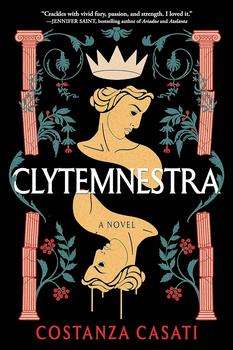Summary | Excerpt | Reading Guide | Discuss | Reviews | Beyond the Book | Readalikes | Genres & Themes | Author Bio

A Novel
by Costanza Casati
"He is no different from all the others," Helen tells her as they hurry down the narrow street of craftsmen's workshops and stores around the palace. The street is a shortcut to the square where textile manufacturers and dyers run their errands.
"I believe he is different, but we will see," Clytemnestra replies, missing some steps on the cobbled street.
"Slow down! Why are you running?" Helen pants.
Clytemnestra knows Tantalus is in the stables and hopes he will still be there when they come back.
"We need to collect Mother's tunic before sunset. Hurry!" she says, stumbling from the darkness of the narrow street to the light of the square. The end of summer is near but the sun is fierce, blinding. Clytemnestra stops abruptly, and Helen bumps against her.
"Oh, come on," she says. "You want to go back to see Tantalus."
She takes her sister's arm and guides her across the square. She stops in front of the perfume makers' store to look at the fruit trees and herbs planted in an inner courtyard. Clytemnestra pushes her forward, past the dyers' shops, animal skins hanging by the doors, and toward a smaller shop in one corner. It sells textiles, domain of spinners and weavers. Inside, the space is large and well organized, women working on raw wool and linen.
"We are here for Leda's new chiton," Clytemnestra says, her voice loud and clear.
A woman with black hair and pale skin comes forward, leaving aside the wool she was working on. "Welcome, Princesses," she says. She leads them to the back of the store, where older women are working on tall looms. "Wait here." She disappears behind a curtain.
"When will Tantalus leave?" Helen asks. "Guests never stay so long."
"Maybe he won't," Clytemnestra says.
Behind them, the women are whispering. Clytemnestra turns, trying to catch the words, and they stop immediately, focusing on their looms. Helen is blushing, her eyes downcast.
"What did they say?" Clytemnestra asks.
"It doesn't matter," Helen whispers. Before Clytemnestra can insist, the woman comes back holding a crimson tunic.
Clytemnestra takes it from her and turns to her sister. "Let's go. We must get back."
Helen mumbles something, but as soon as she speaks the women are whispering again. She and Clytemnestra hurry out of the shop, the women's eyes following them.
Outside, in the square, Helen walks ahead of Clytemnestra. She seems troubled, so Clytemnestra leaves her be. She can't wait to leave the tunic by the palace door and run to the stables.
"You really didn't hear that word, did you?" Helen asks suddenly. She is still walking ahead so Clytemnestra can't see her face.
"No."
"Those women called me teras." The word is cutting on her lips. Portent, it means, like a rainbow that appears over the clouds, but also freak, like a gorgon, the monster with snakes as hair. "They've been saying this in the gymnasium too."
Clytemnestra is angry. "Why? Why would they say that?"
Helen turns. Her cheeks are crimson, her eyes full of tears. It is painful to watch her face, the sadness it shows. "They think that Tyndareus isn't my father. That I was born after Zeus raped Leda. They believe this, but they don't say it to my face."
Clytemnestra takes a deep breath. "Let's go back to the shop." Her brother is right: some people must be taught a lesson.
"I thought you were in a hurry to see Tantalus," Helen replies, her voice bitter.
Then she is walking, almost running up the cobbled street that leads back to the palace. Clytemnestra stays in the blinding light of the square, her mother's tunic crumpling in her hands. She wishes the light would scorch her, so Helen could see her pain.
* * *
Back in the half-deserted stables, Tantalus is feeding a chestnut stallion. She walks to him slowly, as if she hadn't run the whole way. When he sees her, he gives the horse a last handful of hay, then turns to her. "I have just heard that you were recently injured in a fight," he says.
Excerpted from Clytemnestra by Costanza Casati. Copyright © 2023 by Costanza Casati. Excerpted by permission of Sourcebooks. All rights reserved. No part of this excerpt may be reproduced or reprinted without permission in writing from the publisher.
Your guide toexceptional books
BookBrowse seeks out and recommends the best in contemporary fiction and nonfiction—books that not only engage and entertain but also deepen our understanding of ourselves and the world around us.